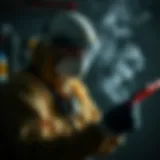Texas Pest Control CEU Courses: Key Insights for Pros


Intro
The pest control industry in Texas faces evolving challenges. As pests become more resilient and treatment methods advance, ongoing education is vital. Continuing Education Unit (CEU) courses provide pest control professionals with knowledge to adapt and excel. This article offers a comprehensive look into CEU courses available in Texas, their significance, and how they can shape pest management practices.
Pest Identification
Understanding pests is critical in pest control. Texas has a diverse ecosystem, home to many common pests. Identification is the first step to effective management.
Detailed descriptions of common pests
Among the prevalent pests are termites, cockroaches, and bed bugs. Termites, for instance, can cause significant structural damage. They thrive in moist environments and are often found near wood sources. Cockroaches are notorious for spreading diseases. They tend to inhabit kitchens and bathrooms, leaving behind droppings. Bed bugs, once nearly eradicated, have resurfaced. They hide in bedding and furniture, feeding on human blood.
Each pest has its behavior patterns and habitats that professionals must learn to recognize.
Signs and symptoms of infestations
Identifying the signs of infestations can save time and resources. Common indicators include droppings, gnaw marks, and damage to materials. For termites, look for mud tubes along walls; for cockroaches, search for feces resembling pepper grains. Bed bugs often leave small blood stains on sheets. Recognizing these signs early helps in timely action.
Prevention Strategies
Preventive measures are essential in pest management. A proactive approach reduces the need for treatments and mitigates infestations.
Home maintenance tips for pest prevention
Regular home maintenance is key. Seal cracks and crevices to deny entry. Keep the yard tidy by trimming bushes and removing debris. Store food in airtight containers to minimize attractants. Regularly check the garage and storage areas, as they can become breeding grounds.
Natural deterrents and barriers
Using natural deterrents can be effective. Essential oils, like peppermint and tea tree, repel various insects. Additionally, diatomaceous earth acts as a physical barrier against crawling pests. Keeping windows and doors screened ensures pests are kept outside.
Treatment Options
When infestations occur, treatment options must be examined. Knowledge of chemical and natural treatments helps professionals devise effective strategies.
Overview of chemical vs. natural treatments
Chemical treatments, such as pyrethroids, are widely used for their immediate effectiveness. In contrast, natural treatments often require persistence and time. Products like neem oil or insecticidal soap are safer for the environment but might not work as quickly.
Step-by-step guides for DIY treatments
For those interested in DIY solutions, several methods are available. For example, to manage ants, create a bait using borax and sugar. Mix equal parts and place it near ant trails. This method is simple and effective for home use.
Preface to Pest Control CEU Requirements in Texas
Continuing Education Units (CEUs) serve a critical function within the pest control industry in Texas. This section provides essential insights into the significance of CEU requirements, particularly for professionals aiming to maintain their licenses and enhance their competencies. In an ever-evolving sector, understanding these requirements is not just a matter of compliance; it is a pathway to personal and professional growth.
Understanding CEUs
CEUs are measurable units that represent the time spent in educational activities, typically used to maintain licenses or certifications. In Texas, pest control professionals must complete a specified number of CEUs to ensure they stay current with industry practices. These credits can be earned through various forms of training, including seminars, workshops, and online courses. The focus on CEUs indicates a commitment to lifelong learning in pest management, reinforcing the need for professionals to be equipped with knowledge about recent advancements and changes in regulations.
Importance of CEUs in Pest Management
The importance of CEUs in pest management cannot be overstated. They serve several crucial functions:
- Regulatory Compliance: In Texas, CEUs are mandated for license renewal, ensuring that pest control professionals are compliant with state regulations enforced by the Texas Department of Agriculture.
- Skill Enhancement: Completing CEU courses allows participants to learn modern pest management techniques, fostering improved approaches to existing challenges in pest control.
- Professional Credibility: Engaging in ongoing education helps professionals establish credibility. Clients are more likely to trust service providers who demonstrate a commitment to staying informed about best practices and safety protocols.
- Networking Opportunities: Courses often facilitate connections with other industry professionals, creating a platform for knowledge exchange and collaboration.
"Continued education is key to maintaining not just compliance, but also a high standard of service in the pest control industry."
In summary, understanding the CEU requirements and their implications is vital for pest control practitioners in Texas. This knowledge lays the foundation for a structured approach to professional education, ultimately leading to better pest management solutions for homeowners and businesses alike.
Regulatory Framework Governing CEU Courses
Understanding the regulatory framework surrounding Continuing Education Unit (CEU) courses is essential for pest control professionals. These regulations ensure that CEU courses adhere to standards that support the development of a knowledgeable workforce. This framework involves guidelines set by the Texas Department of Agriculture, establishing acceptable practices in pest management education. Compliance with these requirements is critical for the renewal of professional licenses in the industry as it safeguards public health and environmental safety.
Being aware of these regulations helps professionals choose accredited courses that enhance their skillsets while satisfying state mandates. Ultimately, the regulatory requirements reflect an ongoing commitment to professionalism and excellence in pest control management that is vital for sustained career growth.
Texas Department of Agriculture Guidelines
The Texas Department of Agriculture outlines specific guidelines for CEU courses related to pest control. These guidelines are designed to ensure that all educational programs meet the essential criteria for quality and relevance. The focus lies on providing a rigorous curriculum that covers vital topics in pest control, ranging from pest biology to application methods.
An important aspect of these guidelines is the requirement for course providers to be accredited and recognized by the state. This ensures that the CEUs earned contribute to the renewal of licenses effectively. Additionally, the Department conducts routine evaluations of these programs to maintain the standards expected by the industry.


License Renewal Requirements
In Texas, pest control professionals must fulfill license renewal requirements that include completing CEU courses. According to state regulations, a specific number of CEUs must be acquired within a defined period, typically every one to two years. The number of required units may vary based on the type of license held by the pest control operator. Furthermore, to remain compliant, professionals must ensure that the courses they attend are approved by the Texas Department of Agriculture.
Key Points about License Renewal:
- Timely Completion: It is crucial to complete the required CEUs within the renewal cycle to avoid lapsing on licensure.
- Approved Providers: Only courses from accredited institutions will count toward the CEU requirement.
- Documentation: Participants must retain records of completed courses as proof during the license renewal process.
Ensuring compliance with these requirements not only fulfills legal obligations but also reinforces professional competence. Understanding the license renewal process is vital in achieving long-term success in the pest management industry.
Types of CEU Courses Available
Understanding the various types of Continuing Education Unit (CEU) courses is crucial for pest control professionals in Texas. These courses ensure that practitioners remain updated on industry standards and best practices. The availability of different formats caters to diverse learning preferences, facilitating ongoing professional development. Whether you prefer online learning, in-person workshops, or a combination of both, there are options that provide distinct benefits and learning experiences.
Online Courses
Online courses have gained popularity due to their flexibility and convenience. They allow professionals to learn at their own pace and schedule. Participants can access materials from anywhere, provided there is an internet connection. This format is especially beneficial for those with demanding jobs or commitments.
Online courses typically cover a wide range of topics relevant to pest control, from pest biology to advanced pest management techniques.
Additionally, many platforms incorporate interactive elements, which can enhance the learning experience. One notable advantage is the ability to revisit content, ensuring a deeper understanding of complex subjects.
In-Person Workshops
In-person workshops offer a unique learning experience that online courses may lack. These sessions facilitate direct interaction with instructors and fellow participants. Such interactions promote networking and the sharing of valuable insights. Workshops often include hands-on demonstrations, which are vital for grasping practical skills. For instance, learning how to identify pests or applying safety protocols can be more effectively taught in a hands-on environment.
The structure of these workshops typically fosters engagement and discussion. Participants can ask questions, seek clarifications, and even share personal experiences. This real-time feedback can lead to a richer understanding of the material. Furthermore, in-person workshops are often tailored to address current industry challenges and trends.
Hybrid Learning Options
Hybrid learning options combine the advantages of both online and in-person education. This format allows participants to complete theoretical components online while still benefiting from the hands-on experience that workshops provide. Hybrid courses are particularly advantageous for those who wish to learn in a structured setting but also value the flexibility of online components.
Such programs may cover essential topics via online modules, followed by in-person sessions where participants can apply what they have learned. This method ensures a comprehensive understanding and retention of knowledge.
As pest control continues to evolve, professionals must adapt their learning to meet changing demands. The variety of CEU courses available provides pathways to staying current.
"Choosing the right CEU format can significantly affect your learning experience and professional growth."
Key Topics Covered in CEU Courses
Understanding the key topics covered in Continuing Education Unit (CEU) courses is essential for pest management professionals in Texas. These topics not only provide foundational knowledge but also enhance practical skills necessary for effective pest control. Each topic addresses specific challenges and requirements in the field, ensuring that professionals remain competent and informed.
Pest Identification and Biology
Pest identification is the cornerstone of effective pest management. Knowing different pest species, their life cycles, and their behaviors allows professionals to tailor their control strategies appropriately. For instance, understanding whether an insect is a pest or beneficial can radically change the approach a technician takes.
Additionally, studying pest biology offers insight into the habits of pests, such as their reproductive cycles and feeding patterns. This knowledge helps in predicting infestations and implementing preventive measures. Accurate identification reduces the reliance on chemical controls, promoting a more sustainable approach to pest management.
From termites to rodents, each species presents unique challenges. A training course that covers this aspect equips technicians to make informed decisions that lead to better outcomes for both clients and the environment.
Integrated Pest Management Strategies
Integrated Pest Management (IPM) strategies represent a comprehensive approach to tackling pest issues. These strategies combine various methods, including biological control, habitat manipulation, and the judicious use of chemicals. The goal is to manage pest populations at acceptable levels while minimizing hazards to people and the environment.
By participating in courses focused on IPM, pest control professionals learn how to assess pest problems, select suitable intervention tactics, and evaluate their effectiveness. They explore case studies that emphasize the importance of monitoring and adaptive management, ensuring that pest control strategies evolve as circumstances change.
An understanding of IPM is increasingly vital, especially in urban settings where the interaction between humans and pests is more pronounced. Staying abreast of these techniques enhances a technician's ability to offer clients well-rounded solutions that are both efficient and responsible.
Chemical Safety and Usage
Chemical safety is a critical aspect of pest control training. Professionals must be knowledgeable about various pesticides, including their active ingredients, application methods, and potential impacts on health and the environment.
Courses on chemical safety instruct participants on proper handling, storage, and disposal of these substances to prevent accidents. Understanding the significance of adhering to label instructions cannot be overstated. This ensures compliance with regulatory standards while also protecting clients and workers from harm.
Moreover, education in this area enables pest control technicians to communicate effectively with clients about risks and safe practices. By educating themselves, pest management professionals can uphold industry standards and maintain their reputation within their community.
Benefits of Completing CEU Courses
Continuing Education Units (CEUs) play a pivotal role in the professional development of pest control experts in Texas. These courses serve as a valuable avenue for enhancing knowledge, building professional networks, and staying abreast of evolving industry trends. For professionals aiming to excel in pest management, understanding the benefits associated with CEU courses is crucial.
Enhanced Knowledge and Skills
CEU courses provide pest control professionals with critical updates and in-depth insights on various topics. They cover essential areas such as pest biology, integrated management strategies, and safety practices related to chemical usage. This knowledge equips professionals to execute their roles with competence and confidence. The skills gained can significantly impact service delivery, leading to improved customer satisfaction and more effective pest control solutions. Professionals who engage in ongoing education often find themselves better prepared for challenges that arise in their field.
Networking Opportunities


Participating in CEU courses also opens doors for networking with fellow professionals and industry experts. Many courses include workshops or group discussions, facilitating interactions that could lead to mentorship or collaboration. Such relationships can enhance one’s career trajectory. Networking within the pest control community further supports knowledge sharing, innovation, and improvements in practice standards. The relational dynamics fostered through these courses can also lead to potential job opportunities.
Staying Current with Industry Trends
The pest control industry is subject to rapid changes in regulations and technological advancements. CEU courses ensure that professionals remain informed about the latest practices and compliance requirements. With evolving methodologies and product innovations, ongoing education prevents the obsolescence of skills and knowledge. This proactive approach is essential for maintaining licensure and effectively addressing new pest challenges as they arise. Understanding current trends also helps in identifying opportunities for business growth in a competitive market.
"Ongoing education is not just a requirement, it’s a pathway to success in pest control."
In summary, the benefits of completing CEU courses extend beyond mere compliance. They enhance essential expertise, promote valuable connections, and ensure that professionals are equipped to handle the landscape of pest management effectively.
How to Choose the Right CEU Courses
Selecting the appropriate Continuing Education Unit (CEU) courses is critical for pest control professionals in Texas. It ensures not only compliance with regulatory requirements but also helps in honing skills and knowledge pertinent to the industry. Many factors come into play when making this decision.
Accreditation and Certification
When considering CEU courses, it is essential to first check the accreditation of the course provider. Courses offered by accredited institutions are recognized and meet the standards set by the Texas Department of Agriculture. This recognition implies that the course content is valid and reliable, providing the necessary knowledge for effective pest management.
Certifications that professionals can obtain from attending these courses hold weight in the industry. They signify a commitment to maintaining and enhancing one's professional qualifications. It is advisable to verify that any certification received is from a reputable source. This will not only reflect on professional competence but also could enhance job prospects or career advancement.
Course Content Relevance
The relevance of course content cannot be overstated. Pest control is an evolving field, with new challenges emerging continually. Choosing courses that align with current industry trends is important. For instance, topics like Integrated Pest Management (IPM), chemical safety, and biological pest control methods are increasingly relevant.
Before enrolling, review the syllabus or outline of the course. This will help assess whether it covers essential aspects that will contribute to one’s day-to-day duties. Ensuring that the course addresses your specific pest control focus will enhance its value and applicability in practical scenarios.
Instructor Experience and Expertise
The qualifications of instructors can significantly influence the quality of the CEU course. Instructors should possess both academic credentials and hands-on experience in pest management. Their expertise will enrich the learning experience, providing practical insights and real-world applications of the material discussed.
Look for courses led by professionals who have a deep understanding of the nuances in pest control practices. Often, the best courses feature instructors who have worked in various capacities within the field. They can share their experiences, making the learning process more engaging and informative.
"Choosing a CEU course with a qualified instructor can make all the difference in understanding complex pest management strategies."
In summary, selecting the right CEU courses requires careful consideration of accreditation, course relevance, and instructor expertise. Each element plays a role in ensuring that the time and resources invested in education lead to meaningful professional growth.
Finding CEU Courses in Texas
Continuing Education Units (CEUs) are vital for pest control professionals aiming to keep their certifications active. Finding the right CEU courses tailored to one's needs is essential for both enhancing skills and meeting regulatory requirements. In Texas, there are various avenues to seek out appropriate courses. The importance of this topic cannot be understated as quality education not only advances careers but also ensures compliance with state regulations. A well-informed pest control expert will offer better services, benefitting the industry as a whole.
State Resources and Websites
The Texas Department of Agriculture provides a hub for pest management resources, including the latest information on CEU courses. Their website features an accessible listing of approved CEU courses, aligning with the regulatory framework previously discussed. It is crucial for professionals to regularly visit these official resources to stay updated. Here are a few key elements regarding state resources:
- Official Listings: You can find comprehensive and current lists of CEU courses available for pest control professionals.
- Regulatory Updates: Important changes in laws and requirements are often posted here, ensuring that licensees comply.
- Events Calendar: Many state sites maintain a calendar of upcoming workshops and training sessions.
Furthermore, local extension offices often have information on CEU offerings in the nearby areas, making it easier for professionals to select courses convenient to them.
Professional Organizations and Associations
Joining professional organizations can help simplify the search for CEU courses. Associations such as the Texas Pest Control Association provide valuable resources, including:
- Networking Opportunities: Engaging with other pest control professionals often leads to recommendations for quality courses.
- Access to Exclusive Courses: Members may gain access to specialized training sessions, creating an advantage over nonmembers.
- Publications: Many associations publish newsletters that detail the latest CEU opportunities as well as best practices in pest management.
In addition, these organizations typically host events throughout the year for continued education, such as seminars or conferences, which often qualify for CEUs.
Local Community Colleges and Universities
Local educational institutions represent another rich source of CEU opportunities. Many Texas community colleges and universities offer pest management courses designed to meet CEU requirements. The benefits of pursuing courses through these institutions include:
- Structured Learning Environment: Classes often provide a more guided approach, helping professionals stay on track in their learning.
- Instructor Expertise: Learning from seasoned instructors in the field can enhance understanding and application of pest management techniques.
- Hands-On Experience: Many courses offer practical components, allowing participants to apply their knowledge directly.
Professionals should explore various local institutions to find courses that fit their schedule and professional development goals.
"The pursuit of ongoing education is not merely a requirement; it is an investment in your future."
Challenges in Obtaining CEUs
Continuing Education Units (CEUs) play a vital role in sustaining professional competence in pest control. Despite their importance, several challenges can hinder pest control professionals from successfully obtaining these essential units. Understanding these challenges is critical, as it impacts career growth and adherence to regulatory standards.
Time Management


Effective time management is perhaps the foremost challenge faced by professionals seeking CEUs. The busy nature of pest control work often leaves little room for additional commitments. Many professionals find themselves juggling various responsibilities, from fieldwork to administrative tasks. As a result, allocating specific time slots for CEU courses can seem daunting.
To manage time effectively, it is crucial to create a structured schedule. Many professionals benefit from setting aside dedicated times each week for education. Online courses allow flexibility in learning, which can alleviate some time constraints. Those who plan ahead can balance their work obligations while continuing education.
Accessing Quality Courses
Accessing quality CEU courses is another significant hurdle for pest control professionals. Not all courses meet the rigorous standards necessary for regulatory compliance. With numerous options available, distinguishing between high-quality offerings and subpar ones can be challenging.
Professionals should prioritize courses accredited by the Texas Department of Agriculture. Researching reviews from peers in the industry is also beneficial. In addition, attending workshops endorsed by professional organizations can enhance the learning experience.
Establishing a network with other professionals can provide insights into reputable training programs. Focusing on these strategies can ensure that individuals gain valuable knowledge and skills through quality CEU courses.
Case Studies: Success Stories from CEU Participants
The examination of actual experiences from CEU participants provides invaluable insights into the impact and effectiveness of ongoing education in the pest control sector. These real-world examples serve not only to motivate but also to illustrate the tangible benefits that can arise from investing time in CEU courses. By understanding these success stories, professionals can find relevant paths for their career growth and improvement.
Impact on Career Advancement
Participants often report remarkable advancements in their careers after completing CEU courses. One common outcome is the acquisition of better job positions. Many individuals can leverage their newly gained knowledge and credentials to apply for higher roles within their organizations. For example, a pest management technician who had previously struggled to maintain a clear understanding of regulations found job promotion opportunities after completing a CEU course focused on regulatory compliance.
This shift is crucial. Certifications signify to employers a dedication to professional development and adherence to industry standards. With growing competition, having additional qualifications can set candidates apart during job searches or evaluations within their current places of work.
Additionally, ongoing education often encourages networking and fosters connections within the industry. Many CEU courses provide opportunities to interact with fellow professionals. Engaging with others can lead to collaborations, mentorships, or referrals that can significantly influence one’s career trajectory.
Innovative Pest Management Techniques
Another critical aspect of CEU courses is their role in introducing innovative pest management techniques. In today's world, pest management is continuously evolving. With the rise of technology and new methodologies, pest control professionals must stay current to ensure effective and safe practices.
Through CEU courses, participants learn about advancements that may include integrated pest management strategies, new pesticide formulations, and alternative control methods that reduce reliance on chemicals. For instance, recent studies show that some technicians gained expertise in using natural pest control solutions after completing these courses. This not only supports environmental efforts but also positions them as experts in eco-friendly pest management.
"Ongoing training ensures we are not just relying on traditional methods but also exploring modern solutions that are effective and sustainable." - A recent CEU course participant.
In essence, these case studies of success reveal a common thread: education in pest control fosters a spirit of continual learning. This, in turn, empowers professionals to adapt to industry changes, advance their careers, and implement innovative practices to benefit both their clients and the environment.
Future Trends in Pest Control Education
The landscape of pest control education is changing. It is not just about meeting regulatory requirements or acquiring CEUs; it is about adapting to new methods and technologies. Understanding these trends plays a vital role for professionals looking to stay relevant in the industry and enhance their expertise.
Incorporation of Technology
Technology is making its way into various aspects of pest control education. This includes online learning platforms and mobile applications. Online courses allow busy professionals to gain knowledge at their own pace. This flexibility is important for those juggling work and personal responsibilities.
Some schools and training organizations are using Virtual Reality (VR) and Augmented Reality (AR) to offer practical training experiences. They simulate real-life pest scenarios in a controlled environment where learners can practice techniques without risks. This hands-on approach helps in retaining knowledge better.
Moreover, data analytics is playing a significant role. Pest control businesses can analyze data on pest populations and behaviors. Educational programs are incorporating these advancements into their curriculum. Understanding how to use data effectively can streamline pest management services, which directly benefits the customers.
Evolving Regulatory Framework
The regulations governing pest control are constantly in flux. Governments revise rules to better protect the environment and public health. As these changes occur, educational programs must adapt to ensure they meet the new standards.
For instance, the Texas Department of Agriculture may introduce new guidelines regarding pesticide usage. Courses need to cover these changes so professionals can remain compliant with the law. This ongoing education keeps pest control specialists informed about what is required.
Adaptability becomes crucial when discussing regulatory frameworks. Professionals must be prepared for unexpected updates, which can occur at any time. CEU courses provide the structure and content necessary to help them navigate these changes smoothly.
In summary, staying ahead in pest control education requires embracing technology and being aware of regulatory changes. Both elements contribute to more effective pest management practices. As the industry continues to evolve, so does the manner in which professionals acquire their knowledge. Recognizing these trends is essential for anyone committed to excelling in pest control.
Epilogue: The Value of Ongoing Education in Pest Management
The world of pest management continues to evolve. As new techniques and products become available, pest control professionals must adapt. This adaptation is possible through ongoing education. Continuing Education Units (CEUs) play a significant role in ensuring that professionals maintain their certifications and enhance their skills. The importance of ongoing education cannot be overstated; it is a crucial element for success in the industry.
"Continuing education is not just a requirement; it is a pathway to excellence in pest management."
Maintaining Competence
Ongoing education ensures that pest control professionals stay competent. The pest control field involves dealing with various species, techniques, and regulations. Therefore, knowledge gained must be current. Regularly participating in CEU courses helps professionals remain aware of the latest practices and innovations in pest management. This awareness is vital for not only coexisting with regulations but also meeting customer expectations.
A few key points about maintaining competence include:
- Updating Knowledge: Pest species behavior and treatment methods change. Regular training helps in understanding these changes.
- Regulatory Compliance: Laws and regulations often shift. Education keeps individuals informed about such updates, preventing possible violations.
- Increased Confidence: With updated knowledge, professionals can feel secure in their capabilities, leading to better performance in the field.
Fostering Professional Development
Another vital benefit of ongoing education is professional development. CEUs offer networking opportunities, which can lead to collaborations and partnerships. Learning environments often bring together diverse individuals from the same field, allowing for the exchange of ideas and experiences.
In addition, pursuing further education can open doors to career advancement. Professionals who invest in their education demonstrate commitment and drive, making them attractive candidates for higher positions or specialized roles.
Key considerations in fostering professional development include:
- Mentorship: Networking can lead to mentorship opportunities that foster career growth.
- Adaptation to New Technologies: Technology is transforming pest control methods. Continued learning ensures professionals are not left behind in adopting these innovations.
- Broadened Skill Set: As professionals continue to learn, they gain a wider skill set, making them versatile within the industry.



